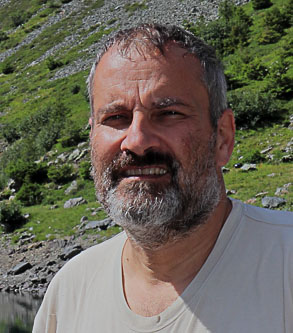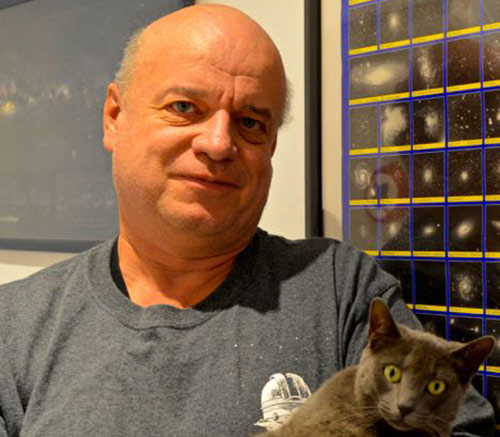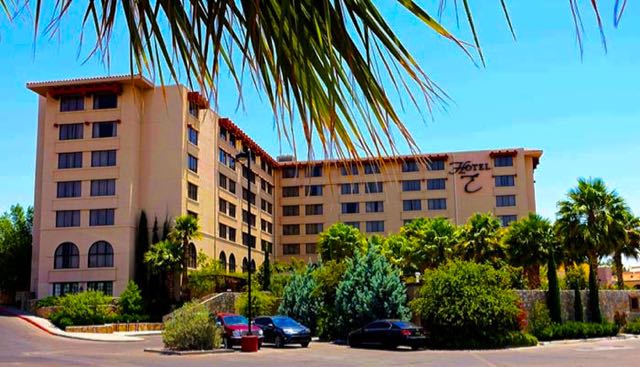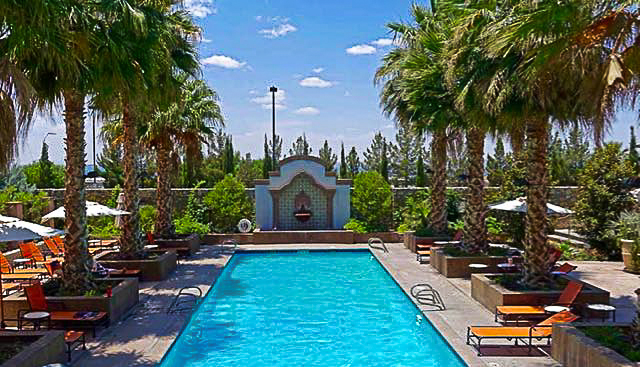Sacramento Mountains Spectroscopy Workshop
Overview.
SOLD OUT - SMSW-2 IS SOLD OUT
WAIT LIST:
If you would like to join the wait list for SMSW-2 please click on the "Contact" menu item and send an email to Ken Hudson at the email address on the "Contact" page.
The second Sacramento Mountains Spectroscopy Workshop (SMSW-2) will be held in Las Cruces, New Mexico on February 22, 23 and 24, 2019.
The first Sacramento Mountains Spectroscopy Workshop was designed to be a bootcamp to help our friends and neighbors get started and move forward with amateur astronomical spectroscopy. We were very successful but we had to turn away interested attendees due to lack of space. SMSW-2 will be bigger and better and we will be able to accommodate many more people, but the goal is still the same. We want to help newbies get started with astronomical spectroscopy and we want to help experienced amateurs learn more and get better. As far as we know, our workshop is unique. You won't find a bootcamp like this anywhere else in the world.
Program.
Our in-depth three-day program includes presentations by experienced amateur astronomers and professional astronomers. These presentations will teach you about the hardware and software used by amateurs and introduce you to the kinds of projects you can do as an amateur and how to contribute to pro / am collaborations. In addition, the professional astronomers speaking at SMSW-2 will provide context and detail regarding the astrophysics of spectra and their own research projects.
By the end of the workshop, attendees will be able to take raw data and calibrate it and process it to produce a finished spectra that can be accepted by the BeSS database validators.
Attendees who want to get a head start, are strongly encouraged to read Francois Cochard's excellent book, "Successfully Starting in Astronomical Spectroscopy - A Practical Guide".
Please note: The session titles and speakers listed below are subject to change due to weather, schedule conflicts, etc.
Friday, February 22, 2019
| Time | Session | Speaker |
|---|---|---|
| 8:00 - 9:00 AM | Included breakfast | |
| 9:00 - 9:15 AM | Introductions, schedule, events | Ken Hudson / Joe Daglen |
| 9:15 - 10:30 AM | Basics of spectroscopy | Francois Cochard |
| 10:30 - 10:50 AM | Break | |
| 10:50 - 11:30 AM | Spectroscopy instruments | Francois Cochard |
| 11:30 - 12:15 PM | ISIS software - installation and overview | Joe Daglen / Ken Hudson |
| 12:15 - 1:30 PM | Included lunch | |
| 1:30 - 3:00 PM | ISIS software - data reduction workflow | Ken Hudson / Joe Daglen |
| 3:00 - 3:20 PM | Break | |
| 3:20 - 4:30 PM | Interpreting spectra of intermediate and high-mass stars | David Whelan, PhD |
| 4:30 - 5:15 PM | AAVSO spectroscopy database | Stella Kafka, PhD |
| 5:15 - 6:45 PM | Dinner on your own | |
| 7:00 PM | Setup and data collection at home of David Doctor, MD |
Saturday, February 23, 2019
| Time | Session | Speaker |
|---|---|---|
| 8:00 - 9:00 AM | Included breakfast | |
| 9:00 - 10:00 AM | Data reduction with ISIS using Lhires data from Friday night | Joe Daglen / Ken Hudson |
| 10:00 - 10:30 AM | Data reduction with Demetra using Alpy data from Friday night | Francois Cochard |
| 10:30 - 10:50 AM | Break | |
| 10:50 - 12:00 PM | What equipment do I need for spectroscopy? | Francois Cochard |
| 12:00 - 1:30 PM | Included lunch | |
| 1:30 - 2:30 PM | Radial velocity and line broadening in spectra | Katie Devine, PhD |
| 2:30 - 3:30 PM | Amateur spectroscopy projects | Stella Kafka, PhD |
| 3:30 - 3:50 PM | Break | |
| 3:50 - 5:00 PM | Spectroscopy of Be stars | Drew Chojnowski, NMSU |
| 5:30 - 9:00 PM | No host cocktail party with heavy appetizers |
Sunday, February 24, 2019
| Time | Session | Speaker |
|---|---|---|
| 8:00 - 9:00 AM | Included breakfast | |
| 9:00 - 10:30 AM | VSpec and the analysis of spectra | Valerie Desnoux |
| 10:30 - 10:45 AM | Break | |
| 10:45 - 11:30 AM | Amateur spectroscopy panel discussion and Q&A | Christian Buil / Valerie Desnoux / Francois Cochard / Olivier Garde |
| 11:30 - 12:00 Noon | College of Idaho student presentation on beginning spectroscopy | College of Idaho students |
| 12:00 - 1:15 PM | Included lunch | |
| 1:15 - 1:45 PM | UVEX (3), a spectrograph for beginners and some science | Christian Buil |
| 1:45 - 2:15 PM | Contributing to the BeSS database | Valerie Desnoux / Ken Hudson / Joe Daglen |
| 2:15 - 3:10 PM | Confirmation of planetary nebula candidates with spectroscopy | Olivier Garde |
| 3:10 - 3:30 PM | Break | |
| 3:30 - 4:00 PM | Lessons learned with beginning spectroscopy | Joe Daglen / Ken Hudson |
| 4:00 PM | Workshop conclusion | Ken Hudson / Joe Daglen |
You can download a PDF version of the schedule from this link: PDF Version
Speakers.
We are thrilled that every speaker from SMSW-1 has agreed to return for SMSW-2. We are also very excited to have three additional outstanding speakers for our second workshop. We believe this is the best group of speakers ever assembled for an amateur astronomical spectroscopy workshop. It's truly a dream team.

Christian Buil
French amateur based in Toulouse, south of France. Christian made the first CCD amateur image of an astronomical object in 1984 and design multiple experimental camera. A book was published « CCD Astronomy » book (1990, Willmann-Bell editor). He participated to the creation of the T60 association in 1982 and made regular missions at the Pic du Midi Observatory. Christian then turned his interest into spectrography and layout the first design concepts of the spectrographs at the creation of Shelyak Instrument (2007). He is the author of IRIS, Image Processing software, and of ISIS, image spectral processings software. Christian made several “premieres” for amateurs among them first amateur discovery of a supernova with a CCD camera (SN1990N), In 2006, first amateur observations of exoplanets with the radial velocity method (51 Peg, HD189733, HD195019…)
Since July he has been elected Honorary Member of IAU, for his contribution to the community.
Christian is a chief engineer in optics, working at CNES, Centre National d’Etudes Spatiales and design optical instrumentation for earth observation satellites.

Drew Chojnowski
I am a fourth year graduate in the NMSU Astronomy PhD program, studying the circumstellar disks and binary companions of hot, massive stars known as Be stars and being funded through my work for the Sloan Digital Sky Survey (SDSS). Since 2012, I have served as a target selection and plate-plug design specialist for the Apache Point Point Galactic Evolution Experiment (APOGEE), which is an SDSS sub-survey focusing on near-infrared spectroscopy of primarily red giant stars in our Milky Way Galaxy. I earned a bachelors degree in Physics & Astronomy from Texas Christian University (TCU) in 2011, having worked on a diverse variety of projects including focuses on luminous blue compact galaxies from the original SDSS survey, giant/mysterious clouds of AGN-ionized gas identified via the Galaxy Zoo project, and use of Milky Way open clusters as tracers of Disc kinematics. To concisely summarize my research interests, I do spectroscopy of things that either make emission lines or are otherwise unusual and/or variable.

Francois Cochard
Francois Cochard is a French amateur astronomer and co-founder and manager of Shelyak Instruments. He was deeply involved in the design and the manufacture of instruments that are today considered standards: Lhires III, LISA, eShel and Alpy 600. As the organizer of the Spectro Star Party every year at the Observatoire de Haute Provence (OHP), he has assisted many observers in their first steps in spectroscopy.
Francois is the author of the book "Successfully Starting in Astronomical Spectroscopy - A Practical Guide".

Joe Daglen
Joe earned his BS degree in Physics, his MD degree from the University of Kansas, and then went on to be a Family Practice physician for 28 years. After retiring from Medicine, he went back to school and subsequently taught high school geometry, calculus, and physics. He then taught at the College of Idaho for seven years. Subjects were business math, anatomy, astronomy, and pathophysiology. He has been involved in astronomy since the 1980's. He has students from the College of Idaho who come annually to his two robotic observatories in New Mexico for research projects. His interests are astrophotography, photometry, exoplanet light curves, and high resolution spectroscopy with a C14 and Lhires III. His web site is Daglenuniverse.com.

Valerie Desnoux
French amateur, based in Paris. Started astronomy in 1978 and designed her first solar spectrograph in 1979. In 1990, joined the T60 association for multiple missions on spectrography with CCD cameras. Valerie initiated the first amateur regular survey of Be Stars in 1992. She is the author of Visual Spec, the first amateur software for spectrography first published in 1995. Valerie is part of the group who co-create the BeSS database ten years ago and publishes every month the BeSS monthly activity reports.
Valerie has a background of electrical engineering and is the R&D manager for advanced projects in Interventional Imaging at GE Healthcare, Buc, France.

Katie Devine
Dr. Katie Devine obtained her Bachelor's degree in Physics and Astronomy from Carleton College in Northfield, MN, and went on to earn her PhD in Astronomy at the University of Wisconsin-Madison. She joined the physics faculty at the College of Idaho in 2009. Her research primarily uses infrared and radio observations to explore star formation, in particular massive star formation. Her current projects examine "bubbles" and "yellowballs," early stages of massive star formation that appear in mid-infrared images.

Olivier Garde
Olivier Garde has been a practicing amateur astronomer since 12 years old. In parallel with his studies in acoustics, he obtained a University diploma in Astronomy and Astrophysics in Paris. In 2002, he began to take an interest in spectroscopy and produced his first spectra. For more than 15 years, he has collaborated on pro / am programs in spectroscopy and participated in observing missions at several observatories in France. In October 2017, he joined the spectrum validator team for the Be Star Spectra database (BeSS) at Meudon Observatory. In March 2018, he became a technical consultant at Shelyak Instruments while continuing the management of his audiovisual production company. Olivier has his own observatory in the south east of France close to the Alps which is equipped with numerous low and high resolution spectrographs (LISA, Lhires III, eShel, WhoppShel, and SBIG SGS).

Ken Hudson
Ken Hudson is a retired IT professional living in Mayhill, New Mexico where he has an observatory and pursues his interest in spectroscopy. He has contributed to the Be Star Spectra (BeSS) database and participated in the BeSS Anniversary Workshop in Paris (Meudon) to plan for the next 10 years of BeSS activity. He has also assisted with planning and testing activities for the upcoming AAVSO spectroscopy database including review of the AAVSO Spectroscopy Manual. Ken is currently assisting David Whelan at Austin College in Sherman, TX with some of his research. Ken and Joe are the organizers of the Sacramento Mountains Spectroscopy Workshops.

Stella Kafka
Dr. Stella Kafka, is the Director of the AAVSO (American Association of Variable Star Observers). Before her tenure at the AAVSO, Dr Kafka held positions at CTIO, Spitzer Science center/Caltech, Carnegie Institution of Washington/DTM and AIP Publishing. The AAVSO is an international non-profit organization of variable star observers whose mission is to enable anyone, anywhere, to participate in scientific discovery through variable star astronomy.

David Whelan
David Whelan is a professor at Austin College in Sherman, TX. He has been working with telescopes since he was an undergraduate, and has used space- and ground-based observatories to study stars, star clusters, the interstellar medium, and galaxies. He once worked as a software programmer with the Spitzer Space Telescope Infrared Spectrograph (Spitzer IRS) team, and earned his PhD at the University of Virginia studying star cluster formation. His primary research interests are the physical characteristics and evolution of high- and intermediate-mass stars.
Venue and Local Info.


SMSW-2 will be held at the beautiful Hotel Encanto de Las Cruces in Las Cruces, New Mexico. The Hotel Encanto is Southern New Mexico's Premier resort hotel.
Single rooms and double rooms are available for $95/night for workshop attendees.
Please use this web site to book your reservations in order to get the workshop discount and help us meet our minimum room requirement:
The closest airport to Las Cruces is El Paso, Texas.
A shuttle service from the El Paso Airport to the Hotel Encanto is available. You can find more information here: Las Cruces Shuttle
Southern New Mexico is a very interesting place to visit - especially in February where the average daily high temperature is around 64°F.
Area activities include:
- Historic Old Mesilla
- White Sands National Monument
- White Sands Missle Range Museum
- Apache Point Observatory (Please note: APO has no visitor center but you can walk around the observatory grounds.)
- Sunspot Solar Observatory
- Organ Mountains Desert Peaks National Monument
- New Mexico Museum of Space History in Alamogordo
- The Zuhl Museum at New Mexico State University
- Farmers and crafts market of Las Cruces
- Mesilla Valley Bosque State Park
Register.
The registration fee for SMSW-2 is $345/person.
The fee includes:
- All presentations on Friday, Saturday and Sunday
- Buffet breakfast on Friday, Saturday and Sunday
- Buffet lunch on Friday, Saturday and Sunday
- The no host cocktail party with heavy appetizers on Saturday night
- Data collection at the home of David Doctor in Las Cruces on Friday night
If you would like to purchase additional tickets for the cocktail party on Saturday night the fee is $18/person
Software Install.
One of the goals of this workshop is to help everyone get started with astronomical spectroscopy. Collecting data is an important task but processing your data is equally important. We will be using two primary programs to process our data. ISIS software will be used to process spectra obtained with the Lhires III spectrograph and Demetra will be used to process spectra obtained with the Alpy spectrograph.
We strongly encourage you to install this software on you own Windows laptop and follow along in the workshop. If you do, you will be able to take raw data, calibrate it and process it to produce a finished spectra!! (Having a Windows laptop and following along with the software is not required - just encouraged.)
If you would like to install ISIS and associated software please:
- Click on this link for installation instructions
- Download the gnu text files when prompted: gnu_files.zip
- Download the list files when prompted: list_files.zip
If you would like to install Demetra, please go to this page on the Shelyak site for the software and installation instructions: https://www.shelyak.com/logiciel-demetra/?lang=en
If you run into problems installing any of this software don't worry. We will help you with installation issues at our session on Friday morning at 11:30am.
Resources.
This section of the SMSW-2 website has links to various resources that may be useful to attendees of the workshop. Please check back frequently for new resources links.
These resources will only be available until the beginning of April so please plan accordingly.
- Arduino Controller Project
- Bulk Rename Utility Screen Shot
- How to Make a GIF in Linux
- ISIS User Manual by The College of Idaho Students
- Link to the Bulk Rename Utility
- Link to Demetra
- Link to gnuplot 4.6.7
- Link to ISIS
- Link to OpenStars
- Link to RSpec
- Neon Spectra for printing
- Practice Files - HD_50658
- Practice Files - HIP_10559_A0V
- Practice Files - Original_Darks-flats
- Practice Files - Sig_Ori_E_HD_37479
- Software Installation Instructions
- Software Install Gnu Files
- Software Install List Files
- TheSkyX User Manual by The College of Idaho Students
SMSW-2 Presentations:
- Buil - UVEX (3), a spectrograph for beginners and some science
- Chojnowski - Spectroscopy of Be stars
- Cochard - Basics of spectroscopy
- Cochard - Data Reduction with Demetra using Alpy data
- Cochard - Spectroscopy instruments
- Cochard - What equipment do I need for spectroscopy
- College of Idaho student presentation on beginning spectroscopy
- Daglen - Introductions, schedule, events
- Daglen - ISIS software - data reduction workflow
- Daglen - Lessons learned with beginning spectroscopy
- Desnoux - Contributing to the BeSS database
- Desnoux - VSpec and the analysis of spectra
- Devine - Radial velocity and line broadening in spectra
- Fox - Poster: Aurora on Uranus
- Garde - Confirmation of planetary nebula candidates with spectroscopy
- Hudson - Contributing to the BeSS database
- Hudson - Introductions, schedule, events
- Hudson - Lessons learned with beginning spectroscopy
- Hudson - ISIS software - installation and overview
- Whelan - Interpreting spectra of intermediate and high-mass stars
Contact.
If you have questions about SMSW-2 or you need additional information please email Ken Hudson at:
ken [dot] hudson [dot] bus [at] gmail [dot] com